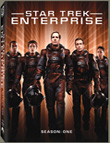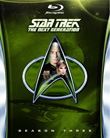Interviewed by Adam Walker and Chris Wales for TrekCore.com
During our coverage of the huge Destination London Star Trek convention last year, TrekCore organized an impromptu sit-down interview with well known Star Trek writer/producer Brannon Braga. Brannon has written more episodes of Star Trek than anyone else (over 100) and worked his way up from staff writer on The Next Generation to be executive producer of Star Trek Voyager and Enterprise, which he co-created with Rick Berman.
http://www.youtube.com/watch?v=qfw19h4n78M
TrekCore: How did you get the gig on The Next Generation?
Brannon Braga: It was a matter of being in the right place at the right time. I had just finished school at UC Santa Cruz, and I got an internship through the Academy of Television Arts and Sciences; that’s the organization that puts on the Emmy Awards and is kind of the keeper of all things television in Los Angeles, kind of like the Academy is to the Academy Awards.
They have a superb internship program and I got one in there, screenwriting. And they sent me on to… there were two screenwriting internships that year. One went to some sitcom that lasted for about six episodes, and one was on a show called Star Trek: The Next Generation.
My counterpart intern went this way, I went this way, and I got the luck of the draw and ended up on Next Gen at a time of transition, where Michael Piller was running the show, and Ron Moore was the only writer he had on staff. It was a quiet place! Piller was writing “Best of Both Worlds, Part II“, that’s the time when I came in and I did my internship and never left. And I remained there for seventeen years.
TrekCore: Writing for Star Trek: The Next Generation is, obviously, something you have to get used with time and experience. Were you familiar with The Next Generation before you came on board?
Brannon Braga: My experience with Star Trek was limited. In school – in grade school, middle school, and high school – there were the fantasy…the Dungeons and Dragons guys; there were the Star Trek dudes; and there were the horror guys. I was part of the Stephen King set. Fantasy and sci-fi… I would end up getting into sci-fi big time once I hit college when I really started reading hard science fiction novels, and just went crazy for the genre. But I was more into Twilight Zone and horror, and the Star Trek guys were going to conventions – primordial conventions – and reading things like “Spock Lives!” in paperback.
I didn’t get it. It wasn’t my bag. I didn’t get into Star Trek until I watched The Next Generation when it first came out. I was one of those people who said, “You know what? Maybe, because I can get in on the ground floor for something I’ll try this Star Trek out.” And it wasn’t my bag again. I wasn’t quite sure how I felt about The Next Generation. By the way, this is a story I think a lot of people will tell.
I didn’t quite get it; I wasn’t sure about Data, an android named Data, are you kidding me? It just seemed childish even to me, at age twenty-one. Then, a couple years went by. So I didn’t really… I watched the first episode with those aliens with the sticks… it just was like, “This isn’t good.” It confirmed my reservations about Star Trek.
But a couple years later, I was in college at UC Santa Cruz, and someone said, “You need to watch The Next Generation. It’s good.” And I suspect that was not an uncommon experience. And they were right. I started watching the show, and it was a stark difference. The writing was so good.
I can’t remember the first episode I actually watched… It was a Geordi episode, with Worf – he’s supposed to give part of his blood or something to a Romulan, and he refused. The guy dies, and Picard is pissed off… I’m like, “This is good stuff!” This was not like the Next Gen I first watched.
And then, when I got the internship on Next Generation, I was into it. I was into Next Gen. That was a long answer.

Brannon Braga describes how it was TNG‘s third season episode “The Enemy” which hooked him into the Star Trek universe.
TrekCore: So, you were obviously prepared to write for it at that stage?
Brannon Braga: I was not prepared to write for it.
TrekCore: But you were into it?
Brannon Braga: I was into it; I knew the characters.
TrekCore: You’ve confessed that a lot of people see you as somewhat of a ‘hack’ with certain topics, like time travel or the Borg. There are these rabid fans who somehow got this opinion about you. But in The Next Generation, certainly, these topics produced amazing episodes. There was “All Good Things…“, “Cause and Effect” – these fantastic episodes. Why do you think that some fans seem to accept those episodes, but not other episodes which you’re still equally proud of, from, say, Voyager or Enterprise?
Brannon Braga: I did some great… we broke new ground on Next Generation, from a storytelling perspective. I mean, the stuff that we did, structurally – like with “Cause and Effect” – was so new that viewers were calling the TV stations thinking something was wrong with the broadcast. That, nowadays, is completely different. People accept that kind of storytelling as part of our vernacular.
It was wild. It was like the Wild West back then. We were breaking a lot of rules, and I think… some unpleasant fans I’ve read, will go online and say, “If you really work at Braga’s early work, that sucks too.” I kid you not. So there’s some revisionist people. Anyway, who knows – they may be right, I haven’t seen those episodes in so long.
TrekCore: No, trust me – they’re still good, Brannon.
Brannon Braga: I think some of the stuff we did on Voyager was even more sophisticated from a storytelling point of view. You know, “All Good Things…” was just the beginning for me, I was just getting going. I wasn’t done! I really got into the stuff on Voyager. I honestly look at some of these Voyager episodes that I’m enormously proud of, like “Timeless“, the hundredth episode of Voyager.
That’s a time travel episode; it’s relatively simple, but it’s filled with striking imagery and character moments. The image of a frozen ship is just perfect…
TrekCore: The opening shot before the credits where it pans up…
Brannon Braga: Yeah. If that had been a Next Generation episode, it would be a classic. It would be ‘one of the good ones.’ I think a lot of it has to do with the crew. A lot of it has to do with it just being a different show, or maybe just being around too long. I stand by the body of work on Voyager as much as I do – if not moreso than The Next Generation.

Brannon Braga cites Voyager‘s 100th episode “Timeless” as one of his crowning achievements from the show and suggests that had it been a TNG episode it would have been a “classic”.
TrekCore: Well, “Timeless” was brilliant. The emotional impact of hearing Janeway’s last log; just filled with, actually, the kind of same moments that the new film had, the emotional resonance of that first scene with Kirk. I mean, you’re still writing time travel stories – you mention you’re doing a comic. What do you think it is that time travel, emotionally or intellectually, brings to a story that makes it something you keep writing and going back to? You must feel very passionate about it.
Brannon Braga: I was never interested in time travel in terms of it’s mechanics. It’s mechanics can be a bit of a headache. It’s emotion. You can get… you can put a character through an emotional trial and take them to places to you can’t otherwise. I look at “All Good Things…” which was a very ambitious piece of time travel, but if you really look at it it’s… if it was a novel, or even… if you took the time travel out, it could just be a story that happened to take place in the beginning, middle, and end of someone’s life. And I’m sure novels like that have been written; stories like that have been written.
If you simply say, “This isn’t literal; this is just the way we’re telling the story”, you think to yourself, “Well, what’s the big deal?” It’s not until you literalize it that you take it to the next level, and you say the person is experiencing this. Then it becomes emotional, times ten. Does that make any sense at all?
TrekCore: Yeah, I think so. I think once you moved on from The Next Generation to Voyager, there was some fans who went the Deep Space Nine way, some fans went the Voyager way. What are your feelings about Deep Space Nine? I don’t think I’ve ever heard your thoughts on the series. Have you seen it all?
Brannon Braga: Of course I’ve seen Deep Space Nine. I was very aware of Deep Space Nine. The writers worked in the same building. We saw each other every day. There was some cross-pollination; I wrote a couple of Deep Space Nine scenes with Bashir, in an episode called “Birthright” in The Next Generation.
So I actually… the only character I’ve ever written for DS9 was Bashir. But Ron and I, you have to remember, Ron Moore and I were working very closely on the movies at that time, so he always knew what I was doing, and I always knew what he was doing. He was always writing a Deep Space Nine script, and I was always writing a Voyager script. We talked all the time; we cross-pollinated I thought Deep Space Nine was terrific. Again, I will say there are episodes of that show like “The Visitor” that are considered classics, but, for some reason, aren’t necessarily spoken in the same breath as some of the Next Generation‘s. But that’s because it was a newer thing.
TrekCore: Do you think that Deep Space Nine, in a way, enjoyed more liberty being in syndication, whereas Voyager was confined to this network so you had the network bosses dictating a large amount of what you can and cannot do?
Brannon Braga: I don’t think Deep Space Nine benefited from being in syndication. I mean, I can’t say for sure, I would say Deep Space Nine benefited more from being third. Being the third series, and there it was… but then Voyager came along, and it was almost like – it’s hard to describe. They started to experiment with serialized storytelling. Stuff that for some reason, they just got away with; that they were able to do, because they were… maybe they almost HAD to do something. They had to set themselves apart, somehow. I don’t know. I wasn’t in the writers room.
Personally, with Deep Space Nine, I don’t think Voyager should have come on the air so quickly. I think Deep Space Nine should have been on its own for a while.
TrekCore: Do think it was pushed out too fast?
Brannon Braga: I think it was, for want of better words, I think they were just kind of laying low and doing their thing, those Deep Space Nine guys. They quietly built an amazing television show. In some ways, I suspect, maybe Rick Berman was more focused on other things, and they just were able take bigger risks than we were.
Go to Part: 1 2
 | Order Star Trek: Enterprise Season 1 Blu-Ray today! |  | Order Star Trek: The Next Generation Season 3 Blu-Ray today! |
|---|
